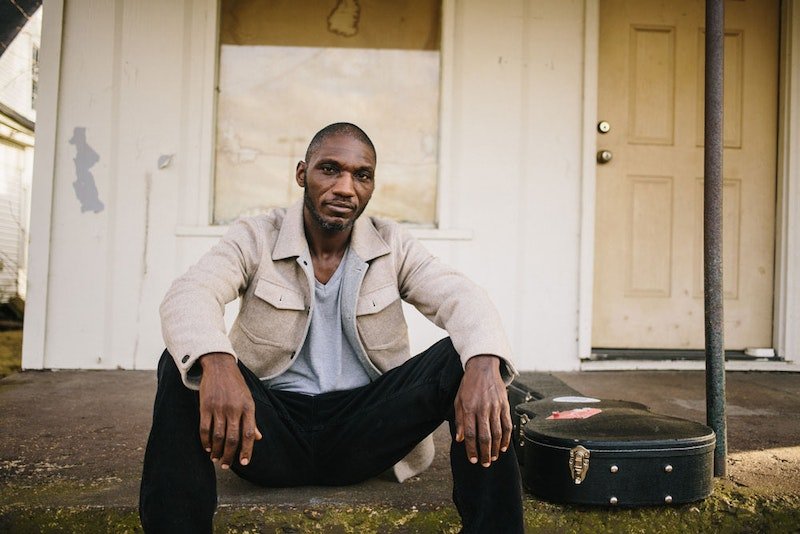An excerpt from an Ashbery poem “Crossroads in the Wind” from the poetry collection Your Name Here (2000) makes an appearance in a music review of artists Cedric Burnside, Courtney Marie Andrews, and the band Quetzal.
Cedric Burnside. Photo courtesy cedricburnside.net.
Crossroads, as John Ashbery writes about them in “Crossroads in The Past,” are life-giving to whoever dares their winds:
“That night the wind stirred in the forsythia bushes,
but it was a wrong one, blowing in the wrong direction.
“That’s silly. How can there be a wrong direction?
‘It bloweth where it listeth,’ as you know, just as we do
when we make love or do something else there are no rules for.”
The crossroad is a foggy, murky apparatus that compels us to struggle with life, and make life out of this struggle. It is natural, like Martin Heidegger’s lichtung (clearing in the forest).
Cedric Burnside, Quetzal, and Courtney Marie Andrews struggle with life, having reached their crossroads. Life, for all three, begins as a feeling that is centered and sculpted not just into consolation, but redemption grounded in direction. “I was just reciting from a feeling,” is how Robert Johnson put it.
Quetzal is a band from East Los Angeles. Their most recent album Puentes Sonoros, which translates to Sonic Bridges, embers because of its hard-won coherence.
For Quetzal the wind of the crossroads, right or wrong, blows toward amalgamated form, key atop of key, this harmonic idea blended in with that harmonic idea toward what seems to be infinity. They are beckoned by shapes they have perhaps seen and discussed at a crossroad. A woman wearing an embroidered tunic dances in a circle with an urbanite who has perhaps never risen at 6am to let out the sheep or gather eggs.
Veracruz (Son Jarocho), Puerto Rico/Cuba (Batá), and Los Angeles, are together orchestrated. The title of the song “El Río” (“The River”) embodies the album and its best idea: an almost liquid arrangement of instrumentation that often flourishes. “El Perdón” (“Forgiveness”) is brilliant because of voice and its control, the music of a band that is harmonically a lit candle, burning slowly: “corazon profundo,” (“profound heart”), they sing.
Courtney Marie Andrews is a chanteuse of controlled narrative, struggling as a poet and a musician to arrive at spiritual principles based in her private concerns. Narrative balladry is her gift, her way of saying to others, “your presence matters to me.” So, she struggles with being “sensitive and stubborn” in “It Must Be Someone Else’s Fault.”
Andrews’s context is landscape, with which she establishes structures of meaning: “It’s a full moon, LA,” she begins the song “If I Told.” The direction of Andrews’s music is the wind of provocation, bringing air to the perceived lifelessness, the suffocation of a person in love. Narrative animates life, and such is love, thus Andrews’s music is love. She could do very well as a singer of forms such as waltzes, and let us hope that one morning “it bloweth” in that direction. She begins her songs with short verses, like Barbara Guest, progressing slowly into longer verses in the English and American poetic tradition, through these wonderlands of her making, a master at breath and projection.
Cedric Burnside is one the most important American musicians playing today. He carries the hammer of better living, the burden of making anew, building the roundhouse of redemption. Redemption from…? “The world don’t / it don’t owe you a thing / the world can be so cold” he sings on “The World Can Be So Cold” on his album I Be Trying. He never specifies this world, preferring to not be consoled about how his values and actions led him to decay. Redemption, then, from living, from collective life and self. He sings to end his struggle and for a true beginning of pure, clear, song.
For Burnside the wind blows toward the ecstatic. What he tells us by the title of his album is that he attempts the ecstatic, to rid himself of his self and to let in the sublime. “Please Lord, step in,” in “Step In” is where he leads us, like a blues Rumi. So, go and tell your brother that he’s risen from the dead, as Jean Ritchie sings. Christ, that old anointment, as Jesus as anointed Christ, is the righteous hammer in American society.
Crossroads are terrifying. The famous American crossroad is the one in which one finds oneself in the South at around midnight and a man, perhaps the devil, tunes your instrument and teaches you music. It is to this crossroad that Son House’s mentee Robert Johnson attributed his music. Ashbery’s crossroad is obviously that of a socialized being struggling with freedom. Another word for this freedom is beauty, the work of Quetzal, Courtney Marie Andrews, and Cedric Burnside.
Contributor
Adolf Alzuphar
Adolf Alzuphar is a music critic.


